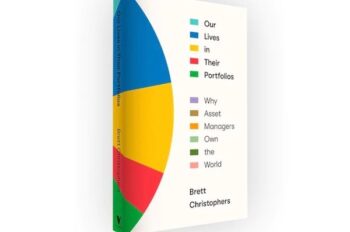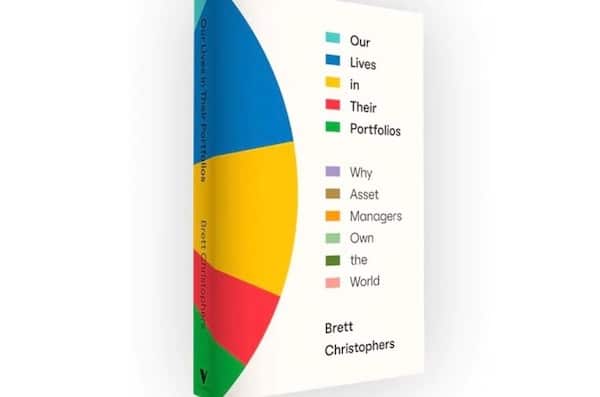
Brett Christophers Our Lives in Their Portfolios: Why Asset Managers Own the World London: Verso Books, 2023. 320 pp., £ 15.99 hb ISBN 9781839768989
Since the global financial crisis, big banks have taken a backseat, and asset managers have become the—often self-appointed—new experts and administrators of capitalism. Yet, collectively they also own global housing and infrastructure assets, prioritizing immediate profits over other considerations like community, locality, workers and the environment. This is the context for Brett Christophers’ new book Our Lives in Their Portfolios: Why Asset Managers Own the World, which discusses global asset managers, their dominance and the impact they have on society.
Christophers’ noteworthy book is an outstanding contribution for several reasons. It innovatively distinguishes between what the author calls an ‘asset manager society’ and neoliberal capitalism as we know it. According to Christophers, asset managers blur the boundaries between finance, society and capitalism. To fully understand their roles in a capitalist society, the macroeconomic context in which asset managers operate needs to be placed at the centre of any discussion on the role of asset managers. Inevitably, this raises the question of whether asset managers’ power over substantial financial resources can be challenged by policies that, ultimately, can lead to more humane and environmentally friendly investments.
The first two chapters offer a financial history that reaches well beyond the post-2008 macroeconomic conditions of the global financial crisis. Yet, Christophers does not shy away from a strong critique of a seemingly now dominant ‘asset manager society’. This includes the core elements of the ‘asset management industry’, namely that investment funds are central to the asset manager society. This is a society saturated in […] debt’ (71).
Christophers correctly outlines the political implications of debt and the complex relationships that underpin the functioning of asset managers within this societal framework. He points out that ‘[y]ou might find yourself living in an apartment owned by a corporation such as Avalonbay Communities […] and asset managers collectively might own 40, 50 per cent, [or even more], of Avalonbay’s shares’ (23). It is not the investment fund itself. Rather, that is ‘borrows money and subsequently shoulders the debt’ (67).
Appropriately, the author critiques the dominance of debt within an asset manager society and discusses how it intertwines with promises made on behalf of various stakeholders. Christophers examines the considerable growth of the asset manager society following the global financial crisis. He analyses broader social issues and the worldwide acting investment institutions of wealthy nations, foremost the U.S., Canada, Europe and Australia.
Christophers shows the extensive reach and impact of firms like Blackstone, Brookfield and Macquarie in the housing market as well as the lack of transparency and public visibility surrounding unlisted infrastructure and real-estate funds. He offers the critique that ‘[e]ver since it came into being, asset manager society has been controversial’ (115) and ‘the world of asset management is cloaked in secrecy’ (116). However, ‘[i]n mid 2019, [one] firm reported that it owned more than 300,000 residential units around the world’ (151). He argues that ‘who ultimately makes money from them, and in what exact proportions—is surely a political problem as much as it is an empirical one’ (117).
This offers fresh insights and significant updates to the common narrative of neoliberalism. Christophers distinguishes between asset manager society and asset manager capitalism. The book contains an insightful exploration of asset managers while, simultaneously, revealing the hidden structures that shape the sector.
The next chapter does an admirable job of addressing challenges and complexities associated with asset managers’ involvement in managing essential infrastructure, signified in ‘[t]he costs incurred by residents and by the state in Bayonne and Missoula because of their water-supply systems […] ranging from “skimped” investment to increased user rates and heightened risk—are the costs associated with asset manager society more generally’ (164).
Christophers ingeniously uses Utopia or Dystopia to reflect on living in such a society and that the real existing asset manager society is far from ideals propagated by the apostles of business and capitalism. Like capitalism and neoliberalism, the asset manager society too creates oppressive structures and global inequality seriously impacting individual rights. He emphasises that ‘[a]sset manager society for those living in it […] such as the tenants of Summer House on the island of Alameda, […] is much more akin to a dystopia’ (164). Particularly, ‘a financialised owner-operator treats housing or infrastructure like a financial asset, thus “financialising” it’ (180). In fact, ‘the real-asset management landscape is characterised by intense churn, [as managers] buy residential or infrastructural assets […] only to put them in the shop window and sell them on just a handful of years later—often to other asset managers’ (188).
He criticises managers of closed-end funds and glorified traders who intensely churn out work based on ‘the golden rules of asset manager society’ (192): they prioritise work over everything else and maximise profits above all.
This leads Christophers to the inescapable question: who gains? When G7 leaders introduced a programme called ‘Build Back Better World’ (255), they promised to use private-sector investment for infrastructure in poorer countries to meet global needs and counter China’s influence. These asset managers, however, only focus on generating returns for investors. The false promises of the G7 and the reality behind it lead to an even more unequal wealth distribution. Christophers describes this in the following way: ‘[a]sset managers are more single-minded […] to make money for those whose capital they manage’ (209), while with regard to the universe of workers such as teachers, nurses, and firefighters, ‘such workers do not have significant retirement savings’ (224). Devastatingly, rather than making the world better as promised, they focus on ‘sharing the spoils’ (212).
This raises concerns about equity, capital access and financial beneficiaries. In other words, when asset managers invest ever more of other people’s funds into societal infrastructure, the widening disparities of asset-based inequality and social stratification become prominent political concerns (Adkins et al. 2020). Consequently, Christophers introduces ‘Scenario Two’ (216) to explore a different set of circumstances related to the themes of asset management, infrastructure investment and economic dynamics.
The final chapter—‘The Future’—is a reminder of the unpredictable character of an asset manager society. By using alliteration, ‘Problems, Problems’ (245) and ‘Crisis After Crisis’ (255), Christophers emphasises the importance of addressing contradictions to make visible the promises and realities of socio-economic development and sustainability.
He argues that if the Covid-19 pandemic or any future pandemic were to become endemic, it would signal a shift where a crisis is no longer ‘a’ crisis but becomes ever-present. This view reframes crises as a persistent element highlighting the need for adaptability and resilience in navigating continued uncertainties. Consequently, Christophers suggests that there is ‘an age of deep-seated crisis both in the provision of shelter and in the maintenance of a habitable geophysical environment’ around the world (257). Finally, the author also engages with the question: how does the return of inflation influence asset manager society? Virtually all of this comprises ‘[t]he distribution of financial gains within asset manager society’, where ‘essential infrastructures will increasingly be held in private hands’ (283). Specifically, ‘[i]n 2020, the amount of money managed by the global asset-management sector passed $100 trillion for the first time’ (287).
This emphasises the significant financial power of asset managers, positioning them as major players in the global financial scene. In short, Christophers’ book outlines what type of asset manager society is likely to emerge and what actions will be taken to get there.
In conclusion, the book is most insightful but also has some still unanswered questions. Whether workers and their pension portfolios—once invested into infrastructural and housing assets—can ‘take back control’ (Gibson-Graham et al. 2013) of their pension and mutual fund investments for more ethical purposes.
Broadly, in the wake of an ever-increasing power of monopolistic corporations, contemporary trends foster a trajectory towards an asset manager society. Increasingly, this will shape our lives. In the end, Christophers’ Our Lives in Their Portfolios calls for strategic thinking and preparedness to fight an economic and political landscape defined by asset managers and their substantial infrastructure investments.
References
- 2020 The Asset Economy (Cambridge: Polity).
- 2013 Take Back the Economy: An Ethical Guide for Transforming Our Communities (Minneapolis: University of Minnesota Press).
Thomas Klikauer (MAs, Boston and Bremen University and PhD Warwick University, UK) teaches MBAs and supervises PhDs at the Sydney Graduate School of Management, Western Sydney University, Australia. He has 700 publications and writes regularly for BraveNewEurope (Western Europe), the Barricades (Eastern Europe), Buzzflash (USA), Counterpunch (USA), Countercurrents (India), Tikkun (USA), and ZNet (USA). His next book is on Media Capitalism (Palgrave).
Thu Nguyen registered as a barrister in Vietnam. She earned her MBA in the United States and a Master’s degree by research in leadership in Australia.

